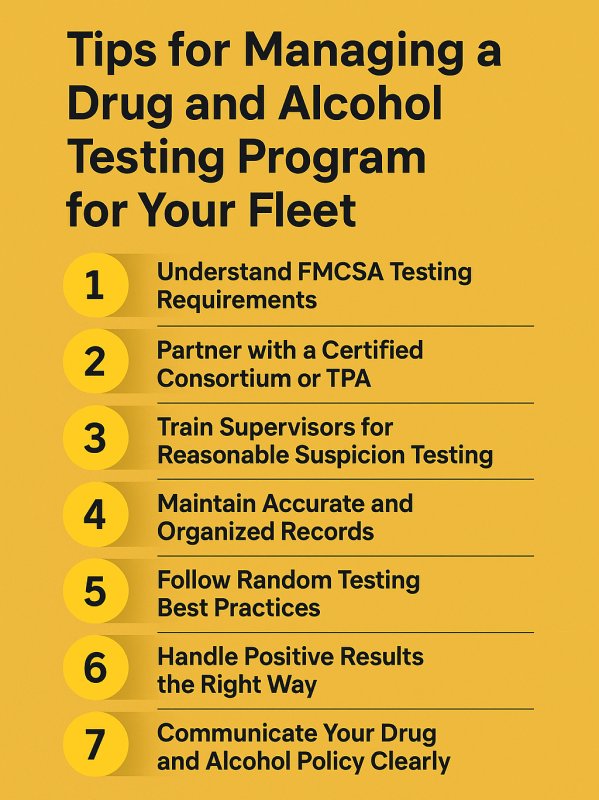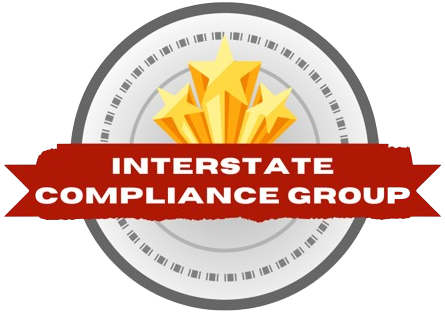If you operate a commercial trucking fleet, a compliant and well-managed drug and alcohol testing program is a must. Not only is it required by the FMCSA, but it’s also a critical component in keeping your drivers, cargo, and the public safe. However, managing this program—especially for a growing fleet—can be complex without a clear process in place.
To help you stay compliant and organized, here are actionable tips for running an effective drug and alcohol testing program for your fleet. Whether you’re handling it internally or using third-party support, these best practices will ensure your program is audit-ready and safety-focused.
Need help managing your program? MyICGroup’s Drug and Alcohol service can take care of the details so you can stay focused on operations.
1. Understand FMCSA Testing Requirements
Before setting up or improving your program, it’s essential to understand what the Federal Motor Carrier Safety Administration (FMCSA) requires.
Key Testing Types Include:
- Pre-employment testing: Required before a driver can operate a commercial vehicle.
- Random testing: Conducted throughout the year based on DOT-set rates.
- Post-accident testing: Required in specific crash scenarios.
- Reasonable suspicion testing: Based on observable behavior or appearance.
- Return-to-duty and follow-up testing: After a positive test or violation.
Each type has specific timelines, documentation, and procedural requirements you must follow.
2. Partner with a Certified Consortium or TPA
Managing the logistics of testing can get overwhelming, especially for mid-sized and large fleets. A Third-Party Administrator (TPA) or drug testing consortium can handle key responsibilities for you.
What They Can Do:
- Schedule and administer drug/alcohol tests
- Manage random testing pool selection
- Maintain records and reporting
- Ensure compliance with DOT standards
Working with experts like MyICGroup saves time and ensures nothing slips through the cracks.
3. Train Supervisors for Reasonable Suspicion Testing
FMCSA requires that any supervisor in charge of CDL drivers complete reasonable suspicion training—60 minutes on drug use and 60 minutes on alcohol misuse.
Best Practices:
- Train all new supervisors within the first 30 days
- Provide refresher training annually
- Document all training completion and keep certificates on file
Trained supervisors are your front line for detecting unsafe behavior and enforcing policy.
4. Maintain Accurate and Organized Records
DOT auditors will look closely at your recordkeeping, and any missing or disorganized files can trigger violations.
Records to Keep:
- Negative and positive test results
- Chain-of-custody forms
- Random testing selection logs
- Driver consent forms
- Substance Abuse Professional (SAP) documentation
Use a secure digital system to store and back up records for at least five years.
5. Follow Random Testing Best Practices
Random testing is a critical part of your program—and one that’s often mishandled.
To Stay Compliant:
- Randomly select drivers throughout the year (not just once per quarter)
- Use a computer-generated process for fairness
- Notify drivers right before testing and ensure immediate compliance
- Maintain strict confidentiality of the process and results
DOT currently requires random testing at 50% for drugs and 10% for alcohol each calendar year.
6. Handle Positive Results the Right Way
When a driver tests positive or refuses a test, you must follow DOT protocol exactly.
Required Steps:
- Immediately remove the driver from safety-sensitive duties
- Refer them to a DOT-qualified Substance Abuse Professional (SAP)
- Document the entire process and notify authorities if required
- Ensure all return-to-duty and follow-up testing is completed
Failure to follow these steps can jeopardize your DOT operating authority.
7. Communicate Your Drug and Alcohol Policy Clearly
Drivers should fully understand your company’s policy regarding substance use.
Tips for Effective Communication:
- Include your policy in onboarding and driver handbooks
- Have drivers sign acknowledgments after review
- Conduct periodic policy refreshers and open Q&A sessions
A transparent, well-communicated policy builds a culture of accountability and safety.

Final Thoughts
Managing a drug and alcohol testing program for your fleet isn’t just about checking boxes—it’s about ensuring safety and maintaining trust with regulators, customers, and the public. With solid procedures, accurate records, trained supervisors, and the right support, your program can run smoothly and stay compliant year-round.
Need help staying on top of testing requirements? MyICGroup’s Drug and Alcohol service can manage the process for you, from pre-employment to follow-up testing. Stay safe, stay compliant, and keep your fleet moving.





